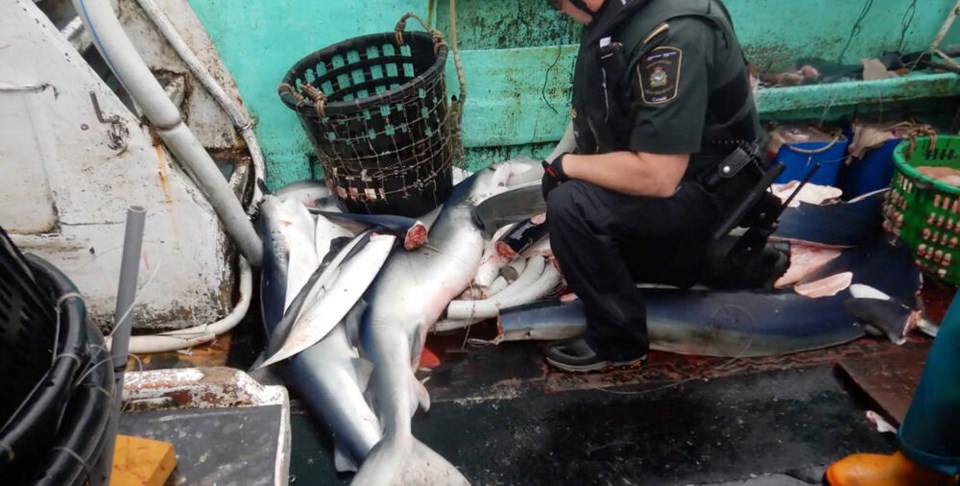A Canadian fisheries aircraft observed a Taiwanese fishing vessel in a remote part of the North Pacific illegally harpooning dolphins this summer.
It was one of dozens of illegal fishing infractions observed and reported by members of a team from the Canadian Coast Guard, Fisheries and Oceans Canada, the RCMP, and other partners during a two-month mission patrolling remote parts of the Pacific Ocean outside Canada’s 200-mile limit.
Other international fishing vessels were caught illegally retaining Pacific salmon and harvesting hundreds of shark fins.
Sean Wheeler, chief of international enforcement for the DFO, said the Taiwanese vessel harpooning dolphins was using the marine mammals as bait to attract sharks. The vessel was reported by the DFO, and Taiwanese authorities arrested the captain of the ship when it returned to its home port, Wheeler said.
It was DFO’s third annual patrol aboard the Canadian Coast Guard Ship Sir Wilfrid Laurier to deter illegal, unreported and unregulated fishing under Operation Pacific Guard.
It was also the first to have representatives from four nations on board a single patrol vessel, with fisheries officers from Canada, Japan, South Korea and the United States.
Fishery officers and support personnel patrolled 17,773 kilometres of open ocean from May to July.
The crew monitored several hundred fishing vessels, conducted 41 inspections of fishing vessels and interacted with more than 1,000 crew members.
The high-seas inspections resulted in 39 violations of international fisheries requirements. The most prominent was shark finning, but there was also the illegal harvest of dolphins, misreporting or inaccurate reporting of catch and bycatch, most notably salmon, as well as obstruction and the destruction of evidence.
Some of the vessels were seen by DFO drones and long-range aircraft throwing catches overboard.
Canada also deployed a DFO fisheries enforcement aircraft, a Dash-8 normally based in Campbell River, to Hokkaido, Japan, where it was used for daily patrols to monitor fishing activity.
The aircraft worked with the crews of the CCGS Sir Wilfrid Laurier to spot fishing vessels, identify ships and watch for illegal dumping.
In all, 366 fishing vessels were inspected by air, and 51 potential violations related to shark finning, pollution, salmon retention, and marking requirements were detected.
The boardings gave Canadian officers their first opportunity to enforce the newly adopted ban on Pacific salmon retention, in effect for North Pacific fishing fleets since July.
Fisheries officials did not specify the country of origin of the vessels found with illegal catches or infractions, but said most were part of Asian distant-water fleets, flagged in such countries as China, Taiwan, Japan, Korea and Russia.
More than 1,100 vessels are registered to fish in the high seas of the North Pacific.
Canadian fishery officers are not permitted to seize illegal catches.
Wheeler said Canada works with the ships’ flag states to support further investigations and fines, and potential sanctions on offending vessels.
He said the DFO provides a report with photo and video evidence, and they are held accountable to members of international fisheries organizations.
“All of this evidence gets taken up to a significant, court-ready level,” Wheeler said.
Fisheries officer Blair Thexton of Victoria, one of 20 on the mission, was part of boarding crews that clambered aboard the vessels and inspected the freezers and holds of ships.
He said the teams used rigid-hulled high-speed vessels to approach each ship while a drone operated from the CCGS Sir Wilfrid Laurier watched the deck and any suspicious activity.
An armed enforcement team boarded first, followed by two deck teams and a bridge inspector. The inspector would go to the bridge with the ship’s captain to look over the paperwork for the catches, and then confirm the catches with the teams in the hold.
Wheeler said there has been a steady rate of compliance with the international fishing fleets. Canada has been part of the mission since the early 1990s and has led the patrols for the past three years.
“I think a lot of the captains are expecting us now,” said Wheeler, adding they are largely complying with regulations but are sometimes not familiar with newer rules.



